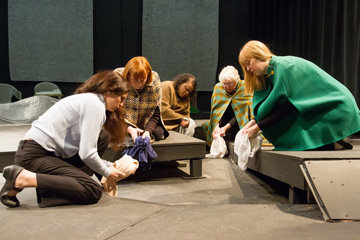Before Sept. 11, 2001, there was Dec. 21, 1988 when Pan Am Flight 103 exploded over Lockerbie, Scotland, killing all 259 passengers on board and 11 people on the ground. While the Lockerbie bombing and response of Lockerbie residents serves as the factual backdrop for playwright Deborah Brevoort’s “The Women of Lockerbie,” the play is a dramatic work of fiction about dealing with grief in the wake of a traumatic act of violence. Combining the powerful script with strong performances from a talented cast, Riverwalk Theatre’s production of “The Women of Lockerbie” is a touching tribute to the Lockerbie victims, as well as a relevant examination of how we try to make sense of the senseless.

Seven years after the Lockerbie bombing, Americans Madeline and Jeff Livingston (Janet Colson and Jeff Magnuson, respectively) visit Lockerbie to remember their son, who was aboard the flight. But Madeline wants more than just to remember; she wants to find a piece — any piece — of her son to bury. The bomb was directly under his seat, so the chances of finding even a fragment of his remains are slim.
In Lockerbie, they meet a group of women — played by Gini Larson, Jackie Payne and Erin Hoffman — who are working to gather the clothes of the victims, launder them and return them to the grieving families. Doak Bloss plays intransigent bureaucrat George Jones, who refuses to release the clothes to the women, citing Washington policy and the fact that the clothes are “contaminated.”
But this show is not about clothes, clean or dirty. It’s about how people respond to unexpected tragedy. At first, Bill seems like a stoic, unfeeling man coddling his delirious wife. In describing his wife’s current state to the Lockerbie women, he says, “She lies on the living room couch and weeps. She goes over and over the moment.”
We eventually learn that he is more repressed than unfeeling. “I had to do everything,” Jeff says, recounting how he had to manage all the painful logistics, including talking to the press and returning all of his son’s Christmas presents to the store.
Magnuson and Colson are wonderful in their roles, with Colson’s manic exasperation fueling Magnuson’s frustration and wearing away his patience. They’re matched by Larson, Payne and Hoffman who each recount the graphic horrors on the ground with a necessary sense of emotional detachment. Gay Oliver turns in a strong performance as Hattie, George’s assistant.
As the de-facto leader of the women, Larson not only recounts her own tragic connection to the crash, but she also gets to deliver a scathing criticism of Madeline’s warped sense of American entitlement. More than anyone, Larson grounds the production in emotional authenticity. When she’s not on stage, the actors seem less certain. But as soon as she enters again, the energy locks in.
While the leveled ramps of the set designed by Leroy Cupp feel very minimalistic, they highlight the subtle impressionist set painting and clever lighting. The no-frills feel certainly leaves space for the words to be heard. Director Amy Rickett’s focus is clearly on the acting, and it shows. Rickett also manages to free the dialogue from its poetic, Greek tragedy structure and turn it into a more natural, relatable verse. “The Women of Lockerbie” is a reminder of the sad chaos in the world, as well as the benevolent humanity that can follow.
“The Women of Lockerbie”
Riverwalk Theater 8 p.m. Friday March 11 and Saturday, March 12; 2 p.m. Sunday, March 13 $12/$10 students, seniors and military 228 Museum Drive, Lansing (517) 482-5700, riverwalktheatre.com
Support City Pulse - Donate Today!
Comments
No comments on this item Please log in to comment by clicking here